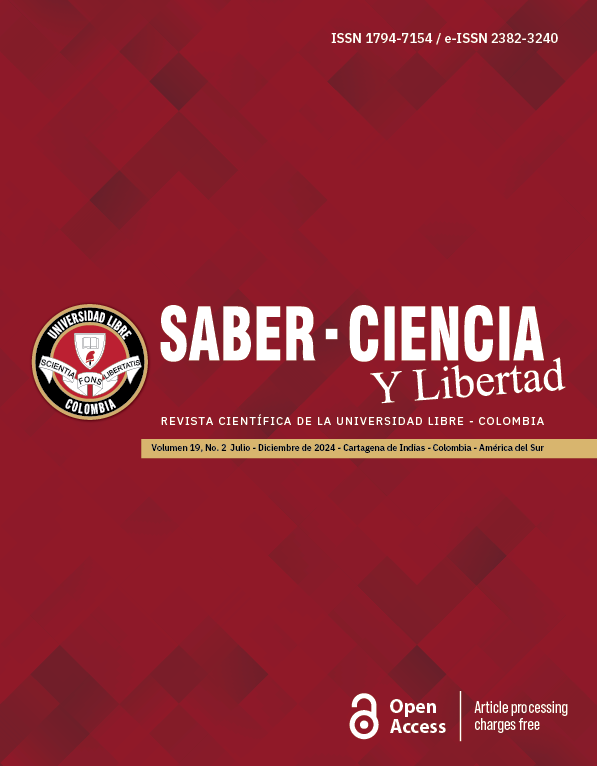An online course as a way to work on socio affective learning strategies in the EFL classroom
DOI:
https://doi.org/10.18041/2382-3240/saber.2024v19n2.12013Keywords:
Socio Affective Language Learning Strategies, implementation, motivation, teacher’s role, affective domains, anxietyAbstract
This article is part of a research final results held in a Master’s Program in Colombia. The aim was to describe the impact that the implementation of a socio-affective strategies (SAS) online course has on the language teachers’ practices in the classroom. It was a qualitative action research and data were collected by teachers’ artifacts, voice recordings a survey and an online course. Data were analyzed under the Thematic Analysis Method principles. Findings are presented in three big categories and five subcategories. The first category is related to the necessity for accepting students as they are and not as the professor wants. In the same way, this category is explained in terms of how success in SAS affects positively teachers and students, how the teacher has to deal with motivation and frustration and how educational policies interfere in teacher’s wishes and what she or he has to do. The second category refers to the relevance of having symmetric relationships into the classroom and perceive it as a place where teachers and learners can learn together. Finally, the third category unveil why a teacher must be a warmhearted being. It was possible to conclude that language teachers’ practices were influenced by a socio affective learning strategies online course strengthening different classroom areas, like teacher student relationships, the dichotomy of what teachers consider to do and what policies really expect, the analysis, reflection and impact about previous learning experience when teachers were students, and the acknowledgement of a variety of approaches for implementing these strategies constantly and in the classroom.
Downloads
References
Al Mutahar, F. F., Nurul, W., & Rafie. (2015). Pengaruh Usia, Pengalaman Kerja, Disiplin Kerja, Dan Motivasi Kerja Terhadap Produktivitas Pekerja. [The Influence of Age, Work Experience, Work Discipline and Work Motivation on Worker Productivity]. Jurnal Mahasiswa Teknik Sipil Universitas Tanjungpura, 1(1), 1–11.
Bhattacharya, M. (2002). Creating a Meaningful Learning Environment Using ICT. http://www.cdtl.nus.edu.sg/brief/v5n3/sec3.htm
Chamot, A’U. & O’Malley, J.M. (1994). The CALLA handbook: Implementing the Cognitive Academic Language Learning Approach. White Plains, NY: Addison Wesley Longman.
Cloutier, R. (1989). Walz, Joel C., error correction techniques for the FL classroom. Language in Education: Theory & Practice Series, Washington D.C. Centre for Applied Linguistics, 1982. The Canadian Modern Language Review, 45(4), 755–756. https://doi.org/10.3138/cmlr.45.4.755
Corder, S. P., B., A. J. P., & Davies, A. (1977). The Edinburgh course in Applied Linguistics. Oxford University Press.
Coskun, L. (2019). The characteristics of Compassionate Teachers as Role Models Opens Ways for Passion, Inspiration, and Openness to the Students. [Conference Session].
Cowie, N. (2011). Emotions that experienced English as a Foreign Language (EFL) teachers feel about their students, their colleagues and their work. Teaching and Teacher Education, 27(1), 235-242. https://doi.org/10.1016/j.tate.2010.08.006
Day, C., & Leitch, R. (2001). Teachers’ and teacher educators’ lives: The role of emotion. Teaching and Teacher Education, 17(4), 403–415. https://doi.org/10.1016/s0742-051x(01)00003-8
Dubin, F. & Olshtain, E. (1986). Course Design. Developing Programs and Materials for Language Learning. Cambridge University Press, Cambridge.
Engels, M. C., Spilt, J., Denies, K., & Verschueren, K. (2021). The role of affective teacher-student relationships in adolescents’ school engagement and achievement trajectories. Learning and Instruction, 75, 101485. https://doi.org/10.1016/j.learninstruc.2021.101485
Freeman, D. & Richards, J.C. (1996). Teacher Learning in Language Teaching. Cambridge: Cambridge University Press.
Gregersen, T. S. (2003). To err is Human: A Reminder to Teachers of Language-Anxious Students. Foreign Language Annals, 36(1), 25–32.
King, J. (2015). “it’s time, put on the smile, it’s time!”: The emotional labour of second language teaching within a Japanese university. New Directions in Language Learning Psychology, 97–112. https://doi.org/10.1007/978-3-319-23491-5_7
Larsen-Freeman, D., & Cameron, L. (2008). Complex Systems and Applied Linguistics. Oxford University Press.
Ministerio de Educación Nacional (MEN). (2014). Derechos Básicos de Aprendizaje. Inglés. Bogotá: MEN.
Ministerio de educación nacional. (2016). Esquema curricular sugerido inglés. English for diversity and equity. Bogotá, Colombia. corde
Oxford, R. (1990). Language learning Strategies: What Every Teacher Should Know. New York: Newbury House.
Oxford, R. (Ed.). (1996). Language Learning Strategies around the World: Cross-Cultural Perspectives. Honolulu, HI: University of Hawaii Press
Pollard, D. (2002). A User’s Guide to Measure Theoretic Probability. https://doi.org/10.1017/cbo9780511811555
Rakib, M., Rombe, A., & Yunus, M. (2016). Pengaruh Pelatihan Dan Pengalaman Mengajar Terhadap Profesionalitas Guru (Studi Pada Guru IPS Terpadu Yang Memiliki Latar Belakang Pendidikan Dalam Bidang Pendidikan Ekonomi). Jurnal Administrate 3(2), 137-148
Rice, J. K. (2010). The Impact of Teacher Experience Examining the Evidence and Policy Implications. CALDER, [Working Paper], 1–8.
Rubio, F. (2007). Self-esteem and Foreign Language Learning. Cambridge Scholars Publishing
Sutton, R. E. (2007). Teachers’ anger, frustration, and self-regulation. Emotion in Education, 259–274. https://doi.org/10.1016/b978-012372545-5/50016-2
Volet, S. E. (2015). Teacher Emotions in the Classroom: Associations with Students’ Engagement, Classroom Discipline and the Interpersonal Teacher-Student Relationship. European Journal of Psychology of Education, 3 (1), 385-403.
Wallerstein, N., Durán, B., Oetzel, J. G., & Minkler, M (Eds.). (2017). Community‐based Participatory Research for Health. San Francisco: Jossey‐Bass.
Yang, H. (2010). Thinking on Middle Students’ Frustration Situation. The Road To Success, 4(1),56-58
Yang J (2021) Revisiting Research Methods in Language Learning Psychology From a Complexity Dynamic System Theory Perspective. Front. Psychol. 12:741045. https://doi.org/10.3389/fpsyg.2021.741045
Downloads
Published
Versions
- 2025-02-11 (2)
- 2024-07-26 (1)
Issue
Section
License
Copyright (c) 2024 María Alejandra Valencia-Rueda, Ilba Yaneth Rodríguez-Tamayo

This work is licensed under a Creative Commons Attribution-NonCommercial-ShareAlike 4.0 International License.





